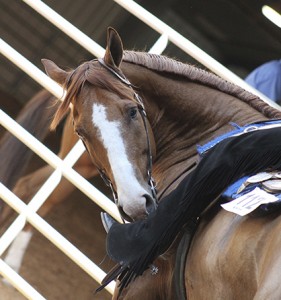Headshaking in Horses
Australian Veterinary Association
Headshaking in horses is a serious and distressing condition for both animals and their owners.
Professor Derek Knottenbelt from the Philip Leverhulme Equine Hospital, University of Liverpool discussed this disturbing condition, and the signs and treatment options, at the Australian Veterinary Association’s Annual Conference in Perth, 25-30 May.
Professor Knottenbelt said that the prognosis for headshaker horses is currently very poor.
“Investigations of headshaking horses are disappointing as signs can be similar to a range of behavioral and clinical abnormalities.
“Whatever is said about the disease in terms of cause, diagnosis or treatment, there’s no doubt that horses are very distressed by it. Some horses are so badly affected that they can cause themselves serious injuries in an attempt to relieve themselves of the discomfort or pain. There are also major safety implications for riders and handlers of horses.
“Many cases of headshaking are seasonal which could suggest an allergic disorder similar to human hay fever, but it’s clear that it’s a neurologic disease rather than an allergy,” he said.
Some of the common signs of headshaking in horses include:
· Involuntary up/down movement of the head and sideways shaking of the head
· Blinking, ear flicking or ear flattening
· Facial or nasal rubbing
· Snorting or serious nasal discharges
· Distracted behavior, refusal to move forward and tail swishing
· Temperament changes such as dullness and non-responsiveness to riding aids.
“Unfortunately, treatment options are presently very limited. The main objective is for the clinician to try and identify the trigger factors and then for owners to devise strategies to avoid that, where possible. There’s a range of medications such as steroids and antihistimines that have been applied to headshaking cases, but they tend to suppress the trigger factor rather than the condition itself. Some drugs such as carbamazepine and gabba pentin can have a positive effect but are usually impractical for one reason or another.
“While we are far behind in our understanding of this disease and its possible neurological origins, we have to be aware of the welfare implications; research efforts in this area should be a priority.”











